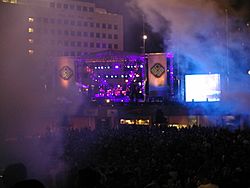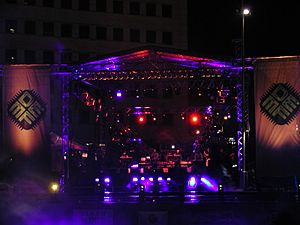Detroit Electronic Music Festival facts for kids
Quick facts for kids Movement Electronic Music Festival |
|
|---|---|

The crowd and main stage at the Detroit Electronic Music Festival, 2002
|
|
| Genre | Electronic Dance Music, Techno |
| Dates | Memorial Day weekend (late May) |
| Location(s) | Detroit, Michigan, United States |
| Years active | 2000 - present |
The Movement Electronic Music Festival is a big yearly party in Detroit, Michigan. It celebrates electronic music, especially a type called Techno. Detroit is known as the birthplace of Techno music. This festival happens every year on Memorial Day weekend.
Before it was called Movement, other electronic music festivals took place in Detroit. These included the Detroit Electronic Music Festival (from 2000 to 2002), then Movement (from 2003 to 2004), and Fuse-In (in 2005). Each of these festivals had different organizers and ideas. But they all shared a goal: to show off the exciting world of electronic music. They also celebrated Detroit's special role as the home of Techno.
In 2017, the Movement festival was even nominated for "Festival of the Year" at the Electronic Music Awards. The festival is planned to return on May 27-29, 2023, at Hart Plaza.
History of the Festival
The very first electronic music festival in Detroit was the Detroit Electronic Music Festival in 2000. It was organized by Carol Marvin and her team. This event was a huge deal! People came from all over the world to celebrate Techno music in the city where it started. It was also one of the first big electronic music festivals in the United States.
Early Years and New Names
In 2001, Ford Motor Company gave a lot of money to help the festival. Because of this, the event was renamed the Focus Detroit Electronic Music Festival. This money helped keep the festival free for everyone to enjoy. It also helped the festival make a profit in its second year. The organizers even worked with Ford to create TV ads that featured music by Juan Atkins, a founder of Detroit Techno.
In 2003, the Mayor of Detroit, Kwame Kilpatrick, decided that Derrick May would organize the festival. Derrick May was a famous DJ, but he hadn't organized a huge festival before. He put together a great team. However, the city of Detroit stopped giving $350,000 in funding, which made things harder for the festival.
The festival happened again in 2004, still called Movement. Even though many people enjoyed it, the event lost a lot of money. This made its future uncertain.
Changes in Leadership
In 2005, Derrick May announced he would no longer organize the festival. Another Techno artist, Kevin Saunderson, stepped in. He planned a new festival called Fuse-In Detroit. It was later just called Fuse-In.
In 2005, Fuse-In became the first festival at Hart Plaza that charged an entry fee. People bought over 41,000 passes. Daily passes cost $10, and weekend passes cost $25. The city of Detroit got $1 from each pass. However, the money from ticket sales was not enough to cover the festival's costs.
On February 16, 2006, Kevin Saunderson announced that he would not continue to produce the festival. This was because of financial losses and not enough advertising. Then, a company called Paxahau took over. They had worked with previous festival organizers. Paxahau has been organizing the festival under the name "Movement" since 2006. They celebrated their 10th anniversary in 2016.
See also
- List of electronic music festivals
- Detroit International Jazz Festival
 | George Robert Carruthers |
 | Patricia Bath |
 | Jan Ernst Matzeliger |
 | Alexander Miles |


